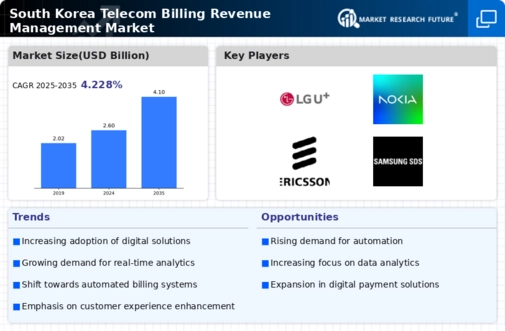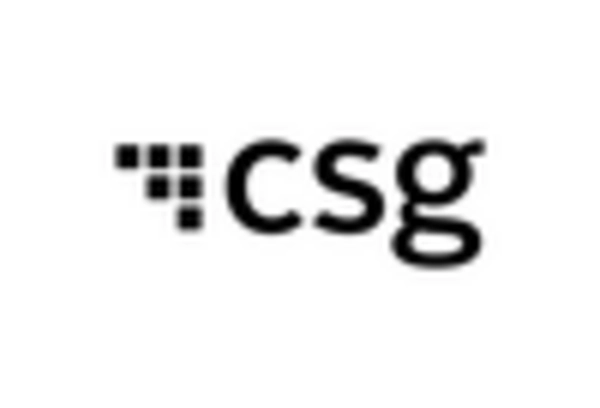Emergence of 5G Technology
The emergence of 5G technology is poised to have a profound impact on the telecom billing-revenue-management market. With the rollout of 5G networks, telecom operators in South Korea are expected to offer new services that require advanced billing capabilities. The increased data speeds and lower latency associated with 5G will likely lead to the introduction of innovative pricing models, such as usage-based billing. This shift necessitates the development of billing systems that can handle complex data usage patterns and provide real-time billing information. Analysts predict that the adoption of 5G could drive a 25% increase in the telecom billing-revenue-management market as operators seek to capitalize on the opportunities presented by this next-generation technology.
Regulatory Compliance and Data Security
In the telecom billing-revenue-management market, regulatory compliance and data security are becoming increasingly critical. South Korea's stringent regulations regarding data protection and privacy necessitate that telecom operators implement robust billing systems that ensure compliance. The need for secure billing processes is underscored by the rising incidence of data breaches, which can lead to significant financial losses and reputational damage. As a result, telecom companies are investing heavily in secure billing solutions that not only comply with regulations but also protect customer data. This focus on compliance and security is expected to drive market growth, as operators seek to mitigate risks and enhance consumer trust in their billing practices.
Increased Competition Among Telecom Providers
the telecom billing-revenue-management market is shaped by increased competition among telecom providers in South Korea.. As the market becomes saturated, companies are compelled to differentiate themselves through innovative billing solutions and enhanced customer experiences. This competitive landscape is driving operators to adopt advanced billing technologies that enable real-time billing and personalized services. The need to retain customers and attract new ones is pushing telecom companies to invest in billing systems that offer flexibility and transparency. Market analysis indicates that this competitive pressure could lead to a 20% increase in investment in billing technologies over the next few years, thereby propelling the telecom billing-revenue-management market forward.
Technological Advancements in Billing Systems
The telecom billing-revenue-management market is experiencing a surge due to rapid technological advancements in billing systems. Innovations such as cloud computing and big data analytics are enhancing the efficiency and accuracy of billing processes. In South Korea, telecom operators are increasingly adopting these technologies to streamline operations and reduce costs. For instance, the integration of AI-driven analytics allows for better customer insights and personalized billing solutions. This shift is expected to drive market growth, with projections indicating a potential increase in market size by 15% annually. As telecom companies seek to improve customer satisfaction and operational efficiency, the demand for advanced billing solutions is likely to rise, further propelling the telecom billing-revenue-management market forward.
Growing Demand for Subscription-Based Services
The telecom billing-revenue-management market is significantly influenced by the growing demand for subscription-based services in South Korea. As consumers increasingly prefer flexible payment options, telecom operators are adapting their billing systems to accommodate various subscription models. This trend is evident in the rise of bundled services, where customers can access multiple offerings under a single subscription. Reports suggest that subscription services could account for over 60% of telecom revenues by 2026. Consequently, telecom companies are investing in sophisticated billing solutions that can handle complex pricing structures and ensure accurate revenue recognition. This evolution in consumer preferences is likely to drive the telecom billing-revenue-management market, as operators strive to meet the changing demands of their customer base.
















